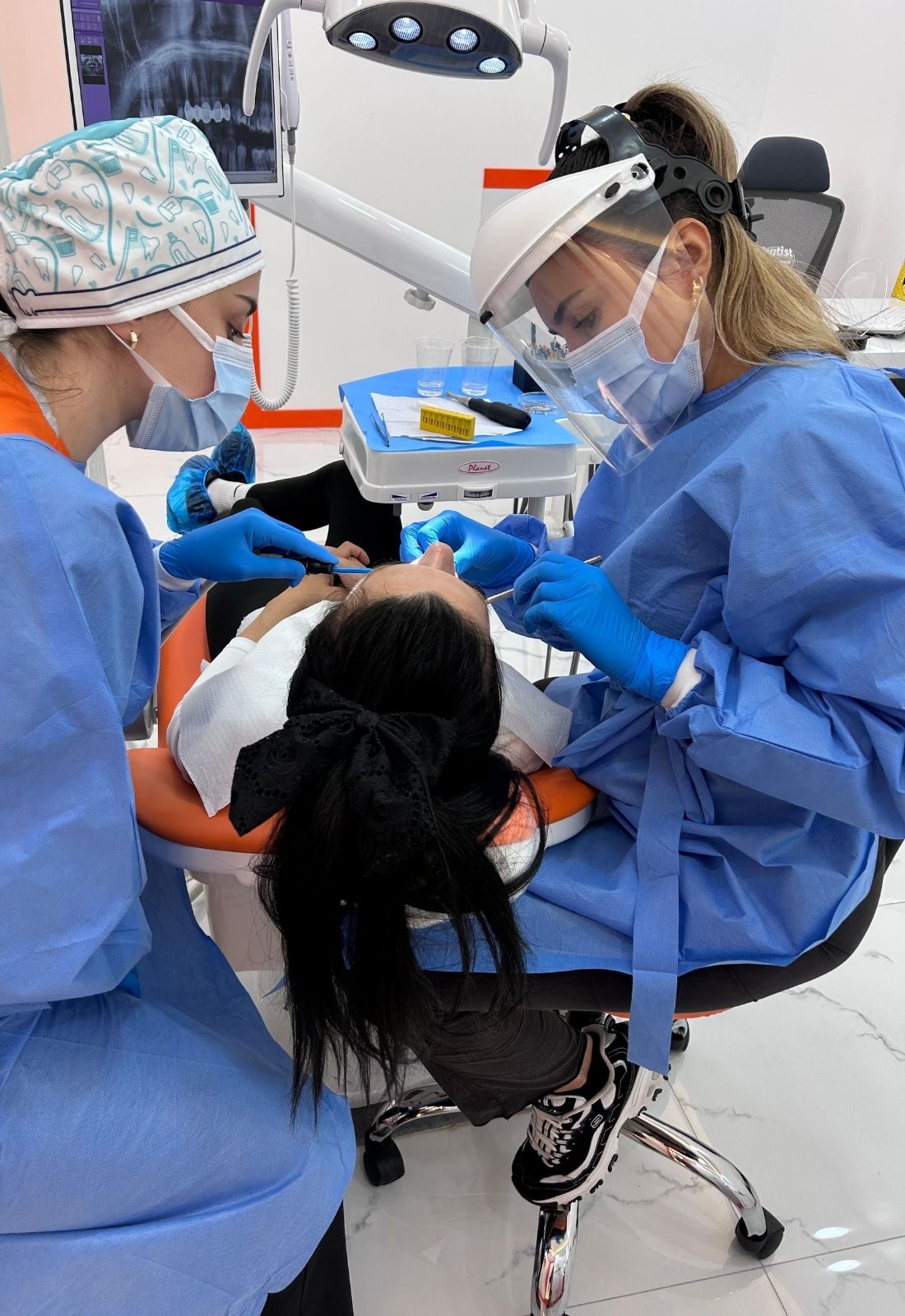
Periodontology
Periodontology is a branch of dentistry focused on protecting the health of the supporting tissues surrounding the teeth and treating their diseases by examining biofilm accumulations and inflammatory responses. This field particularly deals with the management of diseases like periodontitis, which leads to irreversible tissue destruction and alveolar bone loss. Periodontitis can cause tooth loss due to chronic inflammation resulting from microbial imbalance and host immune responses. Factors such as smoking, diabetes, and poor oral hygiene increase the risks. Treatment approaches focus on biofilm control, inflammation management, and preserving tissue integrity.
| Treatment Purpose | To protect the health of the gum and bone tissues supporting the teeth or to treat their diseases through surgical interventions. |
| Treatment Areas | Gingivitis, gum recession, periodontitis (advanced gum disease). |
| Treatment Types | – Scaling and root planing – Root surface smoothing – Laser therapy – Surgical interventions (flap surgery, bone grafting). |
| Treatment Duration | Can range from a single session to several months depending on the severity of the disease. |
| Application Process | 1. Examination and diagnosis 2. Cleaning and deep treatment 3. Surgical procedures if necessary 4. Regular monitoring and maintenance. |
| Suitable For | Individuals showing symptoms such as gum bleeding, swelling, recession, or bad breath. |
| Risks and Complications | Temporary sensitivity after treatment, rarely infection or discomfort post-procedure. |
| Care and Follow-up | Regular dental cleanings, flossing, use of antiseptic mouthwashes, periodic dental check-ups. |
| Advantages | Prevention of tooth loss, improvement of oral and overall health, aesthetic enhancement of the gums. |
| Alternative Treatments | None, although early-stage conditions can be controlled with hygiene measures alone. |
What is Periodontology and Why is it Important?
Periodontology is a branch of dentistry specialized in protecting the supportive tissues of the teeth and preventing and treating their diseases. The gums, periodontal ligaments, and alveolar bone structures are the focus of periodontology. The goal of this field is to support oral health and overall health by preserving these tissues. Particularly, chronic inflammatory conditions like periodontitis, if left untreated, can lead to tooth loss and serious systemic health issues. Periodontology also considers the systemic health effects associated with periodontal diseases.
Treatment methods include:
- Scaling and root planing
- Root surface smoothing
- Surgical interventions
- Regenerative procedures
Periodontal diseases are closely linked with various systemic illnesses such as diabetes, cardiovascular diseases, and respiratory infections. Specifically, periodontitis can complicate diabetes management and uncontrolled diabetes can exacerbate periodontal disease progression. Periodontal health plays a crucial role in preserving not only oral health but also overall well-being.
Maintaining periodontal health is vital not only for preventing tooth loss but also for supporting systemic health, thereby enhancing an individual’s quality of life.
How Do Periodontists Treat Gum Diseases?
Periodontists specialize in diagnosing and treating gum diseases such as gingivitis and periodontitis. They employ various treatment methods to preserve the patient’s dental health and halt disease progression. In the early stages of gum disease, non-surgical treatment options are prioritized. These treatments typically focus on removing tartar and plaque to prevent bacteria from reattaching to the gums and root surfaces. The main non-surgical treatments applied include:
- Scaling and root planing
- Root surface smoothing
- Deep cleaning
These procedures reduce gum inflammation and help lower the pocket depths associated with periodontal disease. Depending on the severity of the condition, multiple sessions may be required.
In advanced gum disease cases, surgical interventions may be necessary. Periodontists perform procedures like flap surgery or pocket reduction surgery to retract the gums, thoroughly clean the root surfaces, and eliminate areas where bacteria may hide. Such surgical procedures may include:
- Flap surgery
- Pocket reduction surgery
- Bone grafting
- Soft tissue grafting
In cases with severe bone loss, guided tissue regeneration and the use of tissue-stimulating proteins can promote the regrowth of natural bone and tissue. These treatments support the restoration of lost bone around the teeth and help maintain dental health.
Some periodontists also offer laser therapy as an option. The use of lasers reduces the need for incisions and sutures, assists in removing diseased tissues and bacteria, and effectively reduces bacterial load and inflammation levels. These treatment methods help prevent complications like tooth loss associated with periodontitis, supporting long-term gum and bone health.
When Should You Visit a Periodontist?
Consulting a periodontist is important when symptoms or health factors indicating the risk of gum disease arise. If gum issues are not addressed early, they can progress to advanced periodontal diseases, leading to severe consequences like tooth loss. It is recommended to visit a periodontist in the following key situations:
- Gum bleeding
- Swollen, red, or sensitive gums
- Persistent bad breath
- Gum recession
- Loosening or shifting of teeth
- Sensitivity to hot and cold
The health of the gums is crucial for preventing tooth loss and maintaining overall oral health. Progressive diseases like periodontitis may require periodontal care and surgical interventions to preserve the roots of the teeth. When gum recession and bone loss occur, dentists may apply treatments such as gum grafting or tissue regenerative therapies to support the healing process. Maintaining oral hygiene is an important step in preventing these issues, but professional treatment is necessary in some cases.
What are the Benefits of Periodontal Surgery?
Periodontal surgery provides numerous functional and aesthetic benefits, especially in cases of advanced gum diseases or situations requiring dental restorations. The primary benefits of key types of periodontal surgeries include:
- Gum Grafts: Treat gum recession, protect tooth roots, reduce sensitivity, and improve aesthetic gum appearance.
- Pocket Reduction (Osseous Surgery): Reduce deep periodontal pockets, control bacterial accumulation, prevent tooth loss, and lower systemic health risks.
- Bone Grafts: Reconstruct the jaw structure, enhance tooth stability, and create a suitable environment for implant placement.
- Dental Implants: Restore the function and aesthetics of missing teeth, improve chewing and speaking abilities, and prevent the shifting of adjacent teeth.
These surgical procedures not only offer aesthetic benefits but also support oral health by halting the progression of periodontal disease. The treated areas become easier to maintain, and oral hygiene levels improve.
What is the Connection Between Periodontal Health and Overall Health?
Periodontal health is closely linked to various systemic illnesses beyond oral health. Particularly, it is associated with diabetes, heart disease, and pregnancy complications. These connections arise from chronic inflammation in the gum tissues spreading into the bloodstream and affecting the body’s immune response, leading to adverse health outcomes.
Diabetes and periodontal health interact bidirectionally, as individuals with diabetes are at increased risk of gum infections, and gum infections can complicate diabetes management. In the context of heart disease, inflammation in the gums can increase cardiovascular risk by allowing bacteria to enter the bloodstream. Additionally, periodontal issues during pregnancy can elevate the risk of premature birth and low birth weight; hence, maintaining gum health during pregnancy is crucial.
Maintaining periodontal health not only prevents tooth loss but also supports overall systemic health, promoting a holistic approach to health and enhancing an individual’s quality of life.

The Best Doctors Performing Periodontology in Izmir
In Izmir, Periodontology is not just about choosing a dentist; working with the best doctors directly impacts the success of your treatment. At AvrupaDent, we offer you the chance to choose from the best doctors performing Periodontology in Izmir. Achieve a healthy and aesthetic smile with us.
Our Branches and Our Doctors
![]()
Health Group
As Avrupadent Health Group, we provide services in many districts of Izmir, especially in Buca and Gaziemir.
Frequently Asked Questions
Gum disease includes conditions like gingivitis and periodontitis. Early symptoms include red, swollen, or sensitive gums, easy bleeding during brushing or flossing. As the disease progresses, gums may recede, making teeth appear longer. Other symptoms include persistent bad breath, loose or sensitive teeth, changes in how teeth come together when biting, and the formation of pus (abscess) between gums and teeth in advanced stages. If gum disease is not detected and managed early, regular dental check-ups become crucial for maintaining gum and overall oral health.
Untreated gum diseases, such as gingivitis and periodontitis, can lead to serious oral health issues, including tooth loss, which affects about 10% of the global population. Periodontitis is a leading cause of tooth loss, observed in approximately 42% of adults over 30 years old. Beyond oral health, untreated gum diseases are linked to systemic illnesses like cardiovascular diseases, diabetes, and adverse pregnancy outcomes. For instance, severe gum disease affects around 1 billion people worldwide and can increase the risk of heart disease and stroke. Additionally, gum disease complicates diabetes management by making blood sugar control more difficult, and pregnant women with periodontal disease have a higher risk of premature birth. Maintaining good oral hygiene and seeking timely dental care are essential to prevent these complications.
Laser gum treatment is generally considered safe and offers advantages over traditional surgery, such as reduced bleeding, less pain, and faster healing. Lasers target diseased tissue while preserving healthy gum tissue, which can lead to better treatment outcomes. However, there are some risks, including thermal damage to surrounding tissues, bleeding, and pain. The success of laser treatment depends on the dentist’s expertise and the settings of the laser used, so it is important to consult with a periodontist to determine if laser therapy is appropriate for your condition.
Post-periodontal treatment care is crucial for supporting the healing process. Follow your dentist’s instructions, which may include taking prescribed antibiotics and pain relievers to manage infection and pain. Apply ice packs to reduce swelling during the first 24 hours. Stick to a soft or liquid diet and avoid hard, crunchy, or spicy foods. Refrain from smoking and consuming alcohol, as these can hinder healing. Brush gently with a soft-bristled toothbrush and use dental floss carefully to avoid damaging the treated areas. Do not forget to attend regular follow-up visits to monitor your progress and ensure proper healing.
Preventing gum diseases involves brushing your teeth at least twice a day with fluoride toothpaste, flossing regularly, and scheduling routine dental check-ups and professional cleanings. Avoiding tobacco products and limiting sugary foods and beverages also protect gum health. These habits help reduce the risk of gum diseases, which affect nearly half of adults in the United States. Maintaining these good oral hygiene practices helps keep gums healthy and prevent the onset of periodontal diseases.

Contact Us,
Renew Your Smile!
To schedule an appointment, please fill out the form below completely and get in touch with us.


